Food Policy and the Environmental Credit Crunch
From Soup to Nuts
Paul Donovan author Julie Hudson author
Format:Paperback
Publisher:Taylor & Francis Ltd
Published:14th Aug '18
Currently unavailable, and unfortunately no date known when it will be back
This paperback is available in another edition too:
- Hardback£145.00(9780415644013)

The changing economic environment for the consumer that is emerging from the wreckage of the financial credit crunch plays directly into the importance of food spending. This is certainly true from the perspective of food prices in the short run, but also from the perspective of sustainability and reducing the impact of the environmental credit crunch. The economic changes we experience now have a bearing on our ability to manage the environmental credit crunch that looms.
Food Policy and the Environmental Credit Crunch: From Soup to Nuts elaborates on the issues addressed in the authors’ first book, From Red to Green?,and asks whether the financial credit crunch could ameliorate or exacerbate the emergent environmental credit crunch. The conclusion drawn here is that a significant and positive difference could be made by changing some of the ways in which we procure, prepare, and consume our food.
Written by an economist and an investment professional, this book addresses the economic and environmental implications of how we treat food. The book examines each aspect of the ‘food chain’, from agriculture, to production and processing, retail, preparation, consumption and waste.
[A]n engaging and surprisingly interesting new work examining the environmental impact of world food policies and changing production methods...Well researched, with footnotes, tables, and graphs to further illustrate points, this book is the rare academic title that is also relevant and well written enough to be enjoyed by general readers interested in the subject...Summing Up: Highly recommended.
– S. Hurst, Miami University, CHOICE
Hudson and Donovan provide a fascinating analysis of the environmental and economic costs of modern food. Their conclusion, that food waste must be managed across the entire food-chain, is a lesson humanity must learn if we are to avoid going hungry.
– Ruth Giradet, Stakeholder Engagement Director, Tesco plc.
A radical change in our relationship with the environment is long overdue. Food is central to that, culturally and economically. Following food from field to waste bin, this book details the power of culture in shaping economics - giving a fresh perspective on tackling the problem of sustainable food supply.
– Bernard Silverman, FRS; Senior Research Fellow, Smith School of Enterprise and the Environment, Oxford; Former President, Royal Statistical Society
This book is both revealing on the food situation today and has predictive potential. The food chain and its environmental and economic aspects, is of concern for all of us. Therefore, this book deserves a wide audience. It will confirm the ideas of the experts in the area, but it is most indicated for all who are active in the different steps of the food chain: from farmers, over processors and retailers, to concerned consumers and waste managers.
– Luc Hens, Environment and Pollution
The book closes with clear policy suggestions for each step of the food chain, ranging from "tax sugar and fat" to "reduce meat consumption by encouraging cultural change" to "change urban planning to allow more local food growing.
– Lucia A. Reisch, Economics and Social Sciences
ISBN: 9781138383067
Dimensions: unknown
Weight: 440g
240 pages